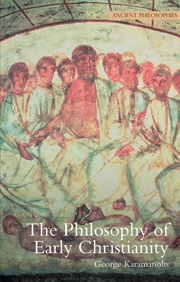Book contents
- Frontmatter
- Dedication
- Contents
- Preface
- Abbreviations
- Chronology
- Introduction
- 1 The Christian conception of philosophy and Christian philosophical methodology
- 2 Physics and metaphysics: first principles and the question of cosmogony
- 3 Logic and epistemology
- 4 Free will and divine providence
- 5 Psychology: the soul and its relation to the body
- 6 Ethics and politics
- Conclusion
- Appendix: the protagonists
- Notes
- Further reading
- Bibliography
- Index
Appendix: the protagonists
- Frontmatter
- Dedication
- Contents
- Preface
- Abbreviations
- Chronology
- Introduction
- 1 The Christian conception of philosophy and Christian philosophical methodology
- 2 Physics and metaphysics: first principles and the question of cosmogony
- 3 Logic and epistemology
- 4 Free will and divine providence
- 5 Psychology: the soul and its relation to the body
- 6 Ethics and politics
- Conclusion
- Appendix: the protagonists
- Notes
- Further reading
- Bibliography
- Index
Summary
In the following I provide some basic biographical information about the main figures I discuss in the chapters of this book, in the hope that this will be helpful to the reader. The order is chronological.
Marcion (c. 85–160)
Marcion was born in Sinope of Pontus and moved to Rome to become integrated in the local Christian community. In 144 he broke with the local Church and founded his own (Tertullian, Adv. Marc. IV.5.3). Marcion distinguished between a higher God and an inferior God; the former is good, saviour, father of Christ, the true God, the latter is just, judge, powerful, but also irascible, maleicent, potentially cruel (Adv. Marc. II.6.1, II.16.3, II.29.1). The former is the God of the Gospels, the latter the God of the Old Testament, which he rejected as a source of Christian doctrine. The latter God reveals himself through the creation of the world, which is incomplete and faulty (Adv. Marc. I.14.1), and through the Law, with which men comply in order to avoid punishment, while the true God reveals himself through his Son, Christ (I.17.1, II.19.1). For Marcion the way to salvation is through an ascetic life. He rejects marriage and procreation so that the created world will not be perpetuated. Marcion wrote a work entitled Antithesis (meaning Opposition; Adv. Marc. I.19.4), but nothing has survived, since he was declared heretical from early on, and all we know about him comes from his critics, such as Tertullian and Irenaeus.
- Type
- Chapter
- Information
- The Philosophy of Early Christianity , pp. 241 - 248Publisher: Acumen PublishingPrint publication year: 2013



